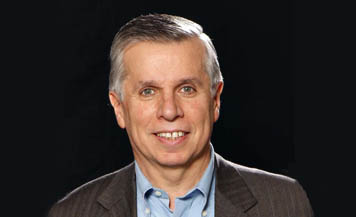Jacob Iasha Sznajder, MD
 Ernest S. Bazley Professor of Asthma and Related Disorders
Ernest S. Bazley Professor of Asthma and Related Disorders
Chief, Division of Pulmonary and Critical Care Medicine
What are your research interests?
My research focuses on lung physiology. In particular, I am interested in exploring the mediators and mechanisms of acute lung injury, regulation of Na,K-ATPase in the alveolar epithelium, signal transduction pathways of gene regulation, protein ubiquitination-degradation, and gene transfer to the alveolar epithelium.
What are some of your current research projects?
One of my research goals is to improve care for patients with lung injury and acute hypoxemic respiratory failure (AHRF). In patients with AHRF, lung airspaces flood with edema from damaged pulmonary vessels and alveolar membranes interfering with oxygen transfer from the airspace into the blood resulting in hypoxemia, hypercapnia, and death if corrective measures are not taken. Our research focuses on the regulation of sodium-potassium ATPase in the alveolar epithelium and its contribution to the resolution of lung edema. The sodium-potassium ATPase maintains cellular ionic and electrochemical gradients through the hydrolysis of ATP coupled to the transport of Na+ and K+ across the plasma membrane. We utilize multiple approaches, including cell and molecular biology in cells and monolayers as well as physiological models. The work of our laboratory and others in this field has provided the scientific basis for the current NIH ARDSnet and other clinical trials to evaluate whether lung edema clearance can be improved with medications and improve the outcomes of patients with respiratory failure.
What is the ultimate goal of your research?
The goal is to improve the survival and quality of life of patients with acute lung injury and AHRF, who have a mortality rate of 30â40 percent, even in top medical centers. If these patients survive their acute disease, they have a very good chance to have productive and fulfilling lives after AHRF.
What brought you to the Feinberg School of Medicine?
It is a strong academic environment committed to academic excellence and critical thinking. The Feinberg School and Northwestern University have a large number of very talented faculty and students who are guided by visionary leadership, making this a very exciting place to be as a physician-scientist.
What are some of the challenges you face?
Currently, the national and international political climate has not placed science as a top priority, resulting in less funding for research. This has been a barrier and a challenge for students and PhD and MD scientists to pursue research. Research requires passion, curiosity, vision, and enthusiasm, which need to be nurtured in the right environment. Generating new knowledge requires commitment, tenacity, and confidence that need to be fostered, particularly in challenging times. Some challenges stem from my own limitations of not being a more eloquent scientific advocate and more persuasive recruiter of our students and young physicians.






